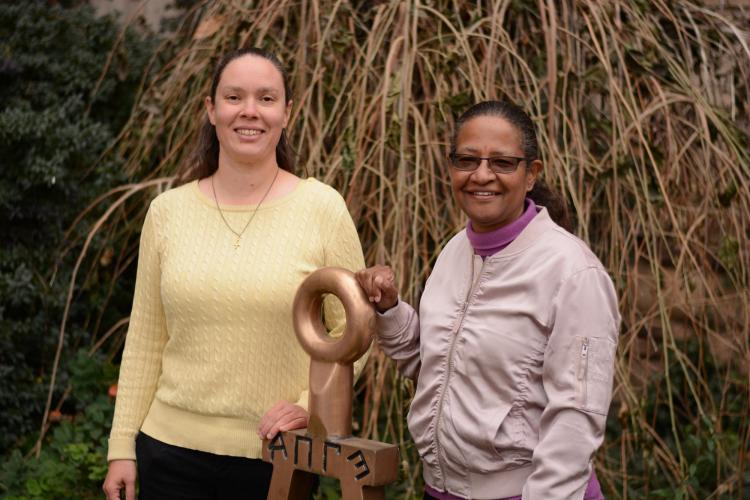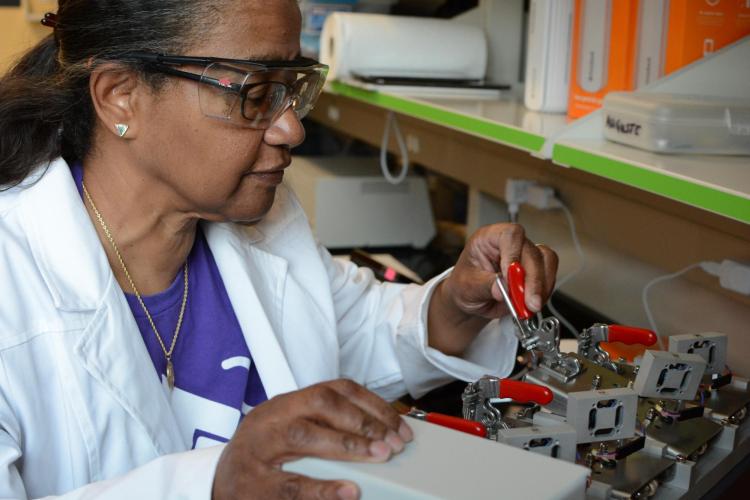Donna Auguste honored by Tau Beta Pi with ‘eminent engineer’ title

Donna Auguste, right, and Sandy Pitzak, left, stand by the Bent of Tau Beta Pi at the entrance to CU Boulder's engineering center.
"It's a great honor to be part of an organization that encourages engineering excellence as well as personal integrity," said Auguste, whose initiation ceremony was witnessed by roughly 500 people during the Tau Beta Pi convention in Denver.
Staff from Tau Beta Pi's national office made the decision based on Auguste's research at ATLAS as well as her extensive service to communities, said Sandy Pitzak, chief advisor of CU Boulder's chapter.
"An 'eminent engineer' sets a good example for the students, and Donna is an excellent example," she said.
Auguste's latest research, coined "DataTip," promotes interest in science, technology, engineering and math (STEM) among children and families of color by making STEM topics relevant to their daily lives. Her strategy includes providing state-of-the-art air quality sensors to African American families who have children with asthma. When sensors detect airborne compounds that can trigger asthma attacks, such as particulates from cooking or chemicals from cleaning, they pass that information on to family members' cell phones. As family members learn to draw correlations between data about airborne compounds and their asthma symptoms, Auguste observes the actions they take to reduce the irritants in their homes. She explores emerging STEM identities among family members who take an interest in the sensor technology and methods of working with the data.

Auguste uses a Markes Micro-chamber to extract volatile organic compounds from a sample.
Auguste said her concern about the declining numbers of minorities employed in STEM fields led her to return to academia for her PhD.
“I’ve developed sensor technology and data science technology over the past few years,” she said. “I had ideas about how those platforms could be used to engage diverse communities with STEM, but I needed to learn more about interdisciplinary research methodologies, such as education research and ethnographic discourse analysis, to pull it all together.”
The origins of Auguste’s enthusiasm for introducing young students of color to STEM traces back to her own experience as a successful engineer and entrepreneur in technology. After working on artificial intelligence in the mid-1980s for Intellicorp, she was hired by Apple and eventually tapped to be lead software engineer on the company’s first personal digital assistant, the Newton. In the 1990s, she moved to Boulder and launched her own company, Freshwater Software, which provided software for maintaining and monitoring web applications, attracting clients like Barnes and Noble, Amazon, IBM, Microsoft and Merrill Lynch.
After Auguste successfully negotiated the sale of Freshwater Software in 2001, she established a foundation, Leave a Little Room, that provided housing, electricity and vaccinations to poor and underprivileged communities around the world. In Tanzania, her organization built and expanded schools, installed solar electricity in small medical clinics to power vaccine refrigerators, and set up ham radio and other communications systems for remote health clinics. In Ethiopia, Leave a Little Room built a middle school and equipped it with books and computers. And in Mexico, the foundation built small homes and a pediatric clinic in a remote community. Most recently, Auguste helped to equip a makerspace at the University of Puerto Rico after Hurricane Maria devastated the island in Sept. 2017.
Tau Beta Pi was founded in 1885 to recognize those who confer honor upon their alma mater through distinguished scholarship and exemplary character as students of engineering, or through their attainments as engineers following graduation.


